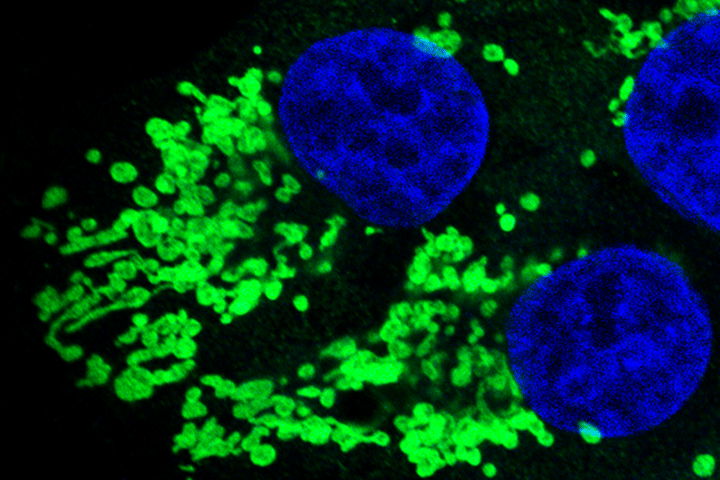Progress in BRCA-Related Cancers Highlighted By the Basser Center

About 30 years ago, no one had ever heard of the BRCA gene.
But pioneering work done by Dr. Mary-Claire King at University of California, Berkeley (now at University of Washington) demonstrated that a single gene on chromosome 17, later known as BRCA1, was responsible for many hereditary breast and ovarian cancers. Fast forward a few years and another gene found on chromosome 13, dubbed BRCA2, was discovered. Later studies linked BRCA variants to prostate cancer, melanoma, and one of the most lethal of all malignancies, pancreatic cancer.
Today, BRCA testing has become a vital tool in the fight against cancer for those who are likely to have an inherited mutation based on personal or family history of breast cancer or ovarian cancer.
For more than a decade, many of the scientific and clinical endeavors related to a better understanding of the BRCA genes have been supported by the Basser Center for BRCA at Penn Medicine’s Abramson Cancer Center (University of Pennsylvania, Philadelphia). It is the first comprehensive center for the research, treatment, and prevention of BRCA-related cancers. Each year, the Center hosts a Breakthroughs & Discoveries Panel, geared to a lay audience, to share the latest information on BRCA-related disease. The May 2023 event was dedicated to the latest information on BRCA-related pancreatic cancer.
A broad-ranging discussion among the experts participating focused on screening and treatment for BRCA-related pancreatic cancer, as well as cancer interception and prevention. Panelists for this event included Susan M. Domchek, M.D., Executive Director of the Basser Center for BRCA; Fergus J. Couch, Ph.D., Basser Global Prize Recipient and Chair of the Division of Experimental Pathology and Laboratory Medicine at Mayo Clinic (Rochester, Minnesota); Kim A. Reiss, M.D., Assistant Professor of Medicine at Penn Medicine, and Bryson Katona, M.D., Ph.D., Assistant Professor of Medicine at Penn Medicine and member of the leadership team for the Men & BRCA program. The event was moderated by broadcast journalist, pancreatic cancer advocate, and Let’s Win board member Dave Price, whose brother Steve died of pancreatic cancer in 2021. The 2023 Breakthroughs & Discoveries Panel was dedicated to Steve’s courage and his memory.
Not A Fairy Tale
In his opening remarks, Robert H. Vonderheide, M.D., D.Phil., Director of the Abramson Cancer Center, briefly touched on the idea of cancer interception, a new concept in cancer care that differs from prevention and therapy. The goal of interception is to catch, or intercept, cancer cells as they begin to develop into pre-cancers or very early cancers, and halt or reverse that process. “It’s about stopping cancer before it takes hold,” he said, likening it the approach to a dry-erase board that can be written on and then wiped off.
This approach has tremendous promise for the way clinicians approach cancer for those at high risk, especially those with BRCA mutations. He emphasized that interception “is not a fairy tale in the lab.” In terms of pancreatic cancer, new KRAS inhibitors show promise with very early lesions, as do vaccines against pancreatic cancer. One such vaccine is now in clinical trials at Penn and the first three healthy BRCA carriers have been treated.
Although research on BRCA genes initially focused on breast and ovarian cancers, Dr. Domchek noted how collaborative research brought more clarity to their roles in other cancers. Of special note is the concept of synthetic lethality, a situation in which mutations in two genes together result in cell death, but a mutation in either gene alone does not. Cancer cells that only have one mutated gene in a specific pair of genes can depend on the normal partner gene for survival.
PARP inhibitors (PARPi), a cancer therapy targeting poly(ADP-ribose) polymerase, are the first clinically approved drugs designed to exploit synthetic lethality. Tumors arising in patients who carry mutations in either BRCA1 or BRCA2 are sensitive to PARPi because they have a specific type of DNA repair defect.
Genetic Testing for All Pancreatic Cancer Patients
The cloning of the breast cancer susceptibility genes BRCA1 and BRCA2 spurred an incredible amount of research to determine exactly how this genomic information can be used to identify and clinically care for individuals with a high risk of developing cancer.
Among the leaders in these endeavors is Dr. Couch, who was awarded the 10th annual Basser Global Prize, an award that recognizes a leading scientist who has advanced research related to BRCA1 and BRCA2 genes.
Couch is chair of the Division of Experimental Pathology and Laboratory Medicine at the Mayo Clinic, a Professor of Laboratory Medicine and Pathology at the Mayo Clinic College of Medicine and Science, and holds the Zbigniew and Anna M. Scheller Professorship in Medical Research in Honor of Dr. Thomas J. McDonald. Couch’s work includes the study of inherited germline genetic alterations and their impact on the development of both breast and pancreatic cancer using genomics and cell biology approaches.
An overarching theme of the panel discussion was the importance of collaboration. Couch emphasized that a pivotal study identifying six genes containing mutations that may be passed down in families, substantially increasing a person’s risk for pancreatic cancer, was due to the collaboration among researchers. In that study, published in 2018, genetic testing was conducted on 3,030 pancreatic cancer patients who were seen at the Mayo Clinic between 2000 and 2016.
The test results of 21 cancer genes were compared to similar results from more than 123,000 patients without pancreatic cancer. The study found six genes clearly linked to an increased risk of pancreatic cancer: BRCA1, BRCA2, CDKN2A, TP53, MLH1, and ATM. These genetic mutations were identified in 5.5 percent of all pancreatic cancer patients, including 5.2 percent of pancreatic cancer patients without a family history of pancreatic cancer.
Because researchers found these genetic mutations in patients with no family history of pancreatic cancer, genetic testing is now recommended for all pancreatic cancer patients as the new standard of care.
This large sample size was the direct result of a continuous research recruitment program set up by the late Gloria Petersen, Ph.D., of the Mayo Clinic. For two decades Petersen studied the epidemiology of pancreatic cancer and had a large cohort of patient samples. Petersen, a senior author on the study, was a Professor of Epidemiology at Mayo.
Advances in Screening and Treatment
According to Katona, one of the top cancers BRCA carriers worry about is pancreatic cancer, especially women who may have undergone surgery to remove their ovaries and breasts.
A new set of national guidelines published by the American Society for Gastrointestinal Endoscopy (ASGE) was released in May 2022. These guidelines recommend annual pancreatic cancer screening for patients who are at increased risk because of genetic susceptibility. While earlier guidelines had restricted screening to only those individuals with BRCA1/2 mutations who had a family history of pancreatic cancer, this new set of guidelines now recommends screening for all patients with the gene variations, regardless of family history. In the future, so-called multi-cancer early detection tests, done with a simple blood draw, may change the screening paradigm.
Treatment for pancreatic cancer has improved dramatically over the last several years, but it is “. . . never enough,” said Dr. Reiss. But in terms of BRCA-related pancreatic cancer the “. . . needle has moved incredibly far in a very short time.” Reiss cited the randomized, double-blind, placebo-controlled phase III POLO trial. That trial focused on a selected group of patients with metastatic pancreatic cancer who had inherited mutations in BRCA1 and BRCA2 genes. The study screened 3,315 patients at 119 centers on four continents for germline BRCA mutations, which were detected in 7.5 percent of patients.
After they received at least 16 weeks of platinum-based chemotherapy, 154 patients were randomized to receive either olaparib or placebo. Treatment continued until radiological exams detected progression of the disease. Progression-free survival, the primary endpoint in this study, was 7.4 months on the olaparib arm, and 3.8 months on the placebo arm. From six months onwards, more than twice the proportion of patients on the olaparib arm were progression-free.
A phase II study Reiss is leading is focused on pancreatic cancer patients with early-stage disease who have completed curative-intent therapy. This randomized, double-blind, phase II trial is designed for patients with pathogenic somatic or germline variants in BRCA1/2 or PALB2. The trial, dubbed APOLLO, has the potential to change the standard of care for patients with curative pancreatic cancer and BRCA1/2 or PALB2 variants.
To Learn More
The panel discussion in its entirety is available on YouTube. Let’s Win encourages you to take a look and listen to the experts talk about the progress being made in BRCA-related cancers. Also, we encourage you to visit the websites of the Basser Center and the Abramson Cancer Center to learn more about available clinical trials and pancreatic cancer research and treatment.







